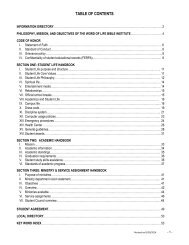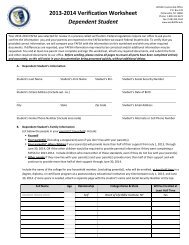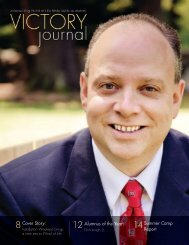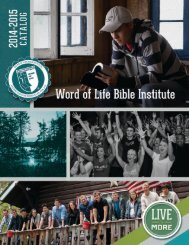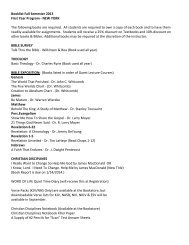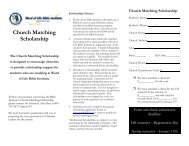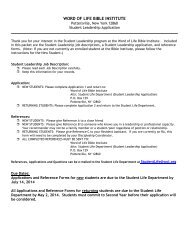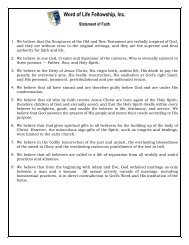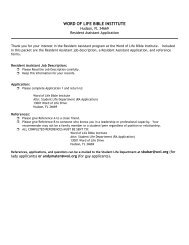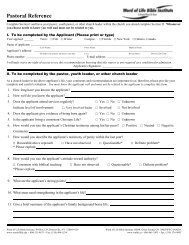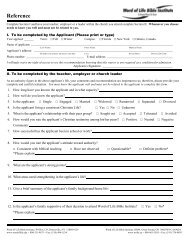11-12 Student Handbook - Word of Life Bible Institute
11-12 Student Handbook - Word of Life Bible Institute
11-12 Student Handbook - Word of Life Bible Institute
Create successful ePaper yourself
Turn your PDF publications into a flip-book with our unique Google optimized e-Paper software.
change is whether or not he or she comes forward <strong>of</strong> his or her own volition or are simply caught. Additionally, another<br />
indicator <strong>of</strong> a student’s genuine heart is whether or not he or she tells the truth. Each <strong>of</strong> these indicators, as well as<br />
others, will always be weighed when considering disciplinary action.<br />
A. OBJECTIVES<br />
1. To enable the school to be run as efficiently as possible. As in any community this size, certain rules and<br />
procedures must be established. In some cases, individual liberties have to be limited if this is to be<br />
accomplished (Romans <strong>12</strong>:10, Philippians 2:3-4).<br />
2. To teach self-control. One <strong>of</strong> the characteristics <strong>of</strong> spiritual maturity is self-control. Not all violations are the result<br />
<strong>of</strong> sinful actions on the part <strong>of</strong> the student but may be a matter <strong>of</strong> the student learning and growing in certain<br />
areas <strong>of</strong> his or her life (Galatians 5:23, Titus 1:8, 1 Corinthians 9:25).<br />
3. To teach obedience to the <strong>Word</strong> <strong>of</strong> God. God holds us accountable for obedience to the standards that He has<br />
revealed to us in the <strong>Bible</strong>. We believe that discipline should seek to cause the student to consider his or her<br />
actions and attitudes and to make the appropriate biblical changes necessary (Hebrews <strong>12</strong>:10-13).<br />
4. To teach redemption in that we seek to instruct, warn or correct the student into deliverance from sinful and/or<br />
destructive attitudes and actions (1 Thessalonians 5:14). We also seek to forgive and restore that member within<br />
the body <strong>of</strong> Christ and the <strong>Word</strong> <strong>of</strong> <strong>Life</strong> family.<br />
B. DISCIPLINE/PERSONAL CONFRONTATION<br />
The purpose <strong>of</strong> personal confrontation is to direct the student’s attention to a particular violation in order to help him<br />
or her make the necessary changes that would bring him or her into conformity with the biblical principle and/or the<br />
institutional requirement, whichever is appropriate. The course <strong>of</strong> action taken will be based on the principle set forth<br />
in 2 Thessalonians 5:14, which includes correcting the unruly, encouraging the fainthearted and helping the weak.<br />
1. Personal confrontation is a result <strong>of</strong> violations <strong>of</strong> Institutional rules and regulations, for conduct that is<br />
unbecoming to Christian character and for a critical attitude.<br />
2. While violations <strong>of</strong> standards are addressed by staff, Resident Assistants or other students designated by the<br />
Deans, we encourage students to confront one another and encourage one another toward “good works,” as is<br />
biblically appropriate (Gal. 6:1; Heb 3:13, 10:24).<br />
3. Discipline is handled in a private manner; therefore, questions concerning the disciplinary system should be<br />
voiced first to the person confronting you and not to other students who are not involved. If resolution is not<br />
accomplished or if there is any uncertainty, you should follow the guidelines for violation appeals given later (VI.,<br />
E.).<br />
4. Disciplinary action for persistent violations will be assigned at the discretion <strong>of</strong> the <strong>Student</strong> <strong>Life</strong> Deans and will be<br />
correlated to the <strong>of</strong>fenses.<br />
5. Frequent disciplinary problems, uncooperative and/or critical attitudes may result in disciplinary probation,<br />
dismissal, or not being re-enrolled for the next semester.<br />
C. DISCIPLINE POINT SYSTEM<br />
Violations <strong>of</strong> the <strong>Student</strong> <strong>Handbook</strong> at <strong>Word</strong> <strong>of</strong> <strong>Life</strong> <strong>Bible</strong> <strong>Institute</strong> will result in discipline points. Each rule is assigned<br />
a point value that is kept in the student’s record. Although, these points are predetermined, the <strong>Student</strong> <strong>Life</strong> Deans<br />
reserve the right to increase or decrease the number <strong>of</strong> points assigned to a violation, as they see fit. Points are<br />
cumulative throughout the year. Although point accumulations can result in a variety <strong>of</strong> consequences, the primary<br />
consequence is discipline work hours served every Monday morning and afternoon. The following is a detailed<br />
description <strong>of</strong> the discipline point system:<br />
1. Warnings<br />
RAs are permitted to distribute warnings for cleanliness violations and other violations <strong>of</strong> a minor nature. Three<br />
warnings <strong>of</strong> any nature will equal one discipline point. The following is a list that includes, but is not limited to,<br />
rule infractions for which students may receive warnings:<br />
i. Cleanliness <strong>of</strong> personal area (bed, desk, closet, etc) – not including dorm job (see one pt. violations.)<br />
ii. Quiet-in-dorms violation<br />
iii. Study Hours violation<br />
iv. Lights-out violation<br />
v. Telephone violations (during prohibited hours) – not including prank phone calls (see 10 pt. violations)<br />
vi. Computer violation (non-standard <strong>of</strong> conduct) – surfing the web, or chatting during prohibited hours, see<br />
section II. B.<br />
Revised on 5/3/20<strong>12</strong> - 25 -




